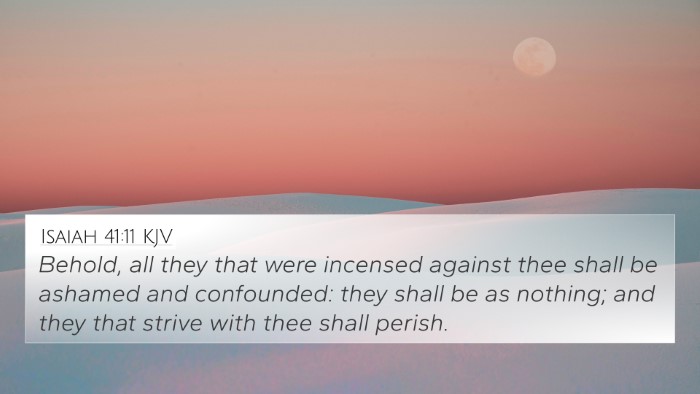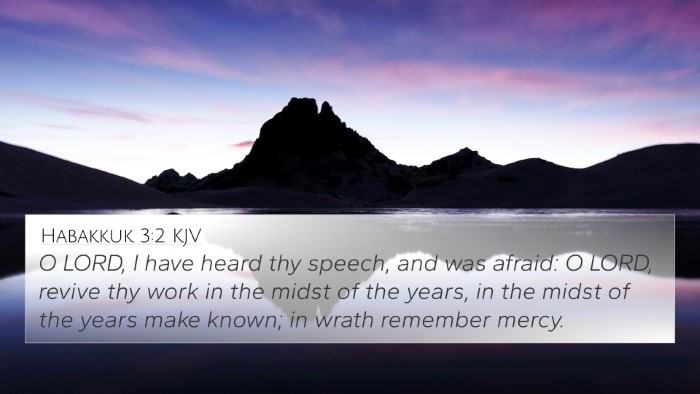Understanding Jeremiah 10:24
Jeremiah 10:24 states: "O LORD, correct me, but with judgment; not in thine anger, lest thou bring me to nothing." This verse offers profound insights into the relationship between God and humanity, emphasizing the necessity of divine correction tempered with mercy rather than wrath.
Commentary Insights
- Matthew Henry: Henry highlights the importance of asking for God's correction. He notes that a plea for judgment signifies a request for proper discipline rather than harsh punishment. It reflects a heart seeking to learn and improve under God's guidance.
- Albert Barnes: Barnes points out the contrast between correction and judgment. He discusses the idea that God's correction is meant to restore, stating that although God's judgment could lead to destruction, His intentions are rooted in love and the desire for true repentance and renewal.
- Adam Clarke: Clarke elaborates on the need for divine justice to be executed mercifully, emphasizing that the plea to avoid God's anger is crucial. He draws attention to the fear of being destroyed under unmitigated wrath, urging believers to seek a balance between divine correction and compassion.
Key Themes in Jeremiah 10:24
- The Nature of God's Correction: Emphasizes the balance of justice and mercy within God's character.
- Accountability: Acknowledges the importance of recognizing one's flaws and seeking improvement.
- Divine Anger vs. Divine Mercy: Contrasts the potential destructiveness of divine anger with the restorative purpose of correction.
Cross-References for Further Study
To comprehend Jeremiah 10:24 fully, it is fruitful to explore related scripture that discusses themes of correction, mercy, and divine judgment:
- Psalm 39:11: "When thou with rebukes dost correct man for iniquity, thou makest his beauty to consume away like a moth: surely every man is vanity." This verse connects to the understanding of God's corrections in light of human frailty.
- Proverbs 3:11-12: "My son, despise not the chastening of the LORD; neither be weary of his correction: For whom the LORD loveth he correcteth; even as a father the son in whom he delighteth." This highlights the loving nature of God's discipline.
- Hebrews 12:5-6: "And ye have forgotten the exhortation which speaketh unto you as unto children, My son, despise not thou the chastening of the Lord, nor faint when thou art rebuked of him." This New Testament passage reinforces the theme of correction as a part of God's relationship with His children.
- Isaiah 26:16: "LORD, in trouble have they visited thee, they poured out a prayer when thy chastening was upon them." This demonstrates the function of God’s chastening as a catalyst for prayer and reliance on Him.
- Lamentations 3:33: "For he doth not afflict willingly nor grieve the children of men." This reminds us that God's corrections are not without purpose and often stem from His overarching love.
- James 1:5: "If any of you lack wisdom, let him ask of God, that giveth to all men liberally, and upbraideth not; and it shall be given him." Here, the theme of seeking guidance and correction from God is upheld.
- Romans 2:4: "Or despisest thou the riches of his goodness and forbearance and long suffering; not knowing that the goodness of God leadeth thee to repentance?" This underscores that God's kindness is meant to lead us toward transformation.
Comparison to Other Biblical Texts
This verse can be placed in dialogue with others that deal with similar themes, demonstrating the interconnectivity of the scriptures and encouraging a deeper understanding of biblical theology:
- Psalm 94:12: "Blessed is the man whom thou chastenest, O LORD, and teachest him out of thy law." This verse links the theme of blessedness with God's correction.
- 1 Peter 5:10: "But the God of all grace, who hath called us unto his eternal glory by Christ Jesus, after that ye have suffered a while, make you perfect, stablish, strengthen, settle you." It connects suffering and correction as a means of preparing believers for eternal glory.
Thematic Bible Verse Connections
Theological themes such as sin, repentance, and divine grace radiate throughout the biblical narrative. Understanding Jeremiah 10:24 enriches these themes and offers a lens through which to view other passages:
- Examine how corrective themes operate in both the Old and New Testaments.
- Identify the interconnectedness of prophetic books with New Testament teaching regarding sin and correction.
Conclusion
In summary, Jeremiah 10:24 richly communicates the necessary balance of correction and mercy within the believer's walk with God. By seeking His correction through a humble heart, one can align with divine purposes without falling into despair. Engaging in cross-referencing biblical texts is vital for a comprehensive understanding of this verse and the overarching narrative of scripture.









